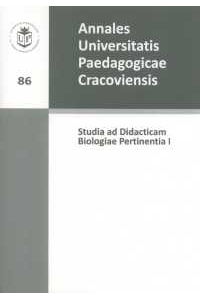Annales Universitatis Paedagogicae Cracoviensis. Studia ad Didacticam Biologiae Pertinentia
Annales Universitatis Paedagogicae Cracoviensis. Studia ad Didacticam Biologiae Pertinentia
Publishing House: Wydawnictwo Uniwersytetu Komisji Edukacji Narodowej w Krakowie
Subject(s): Social Sciences
Frequency: 1 issues
Print ISSN: 2083-7267
Online-ISSN: 2450-3487
Status: Active
- 2012
- 2013
- 2014
- 2015
- 2016
- 2017
- 2018
- 2019
- 2020
- 2021
- 2022
- 2023
- 2024
- Issue No. I/II
- Issue No. I/III
- Issue No. I/IV
- Issue No. I/V
- Issue No. I/VI
- Issue No. I/VII
- Issue No. I/VIII
- Issue No. I/IX
- Issue No. I/X
- Issue No. 1/XI
- Issue No. I/XII
- Issue No. I/XIII
- Issue No. I/XIV
Articles list
{{ article.TitleOriginalLanguage }}
{{ article.TitleOriginalLanguage }}
({{ article.TitleEnglish }})
- Publication: {{ article.Publisher }} ({{ article.Issue }})
- Author(s): {{ article.Authors }}
- Contributor(s): {{ article.Contributors }}
- Language: {{ article.Language }}
- Subject(s): {{ article.Subjects }}
- Issue: {{ article.Issue }}
- Page Range: {{ article.PageRange }}
- No. of Pages: {{ article.NumberOfPages }}
- Keywords: {{ article.Keywords }}
- Summary/Abstract: {{ article.SummaryAbstract }}
- Price: {{ common.currency(article.Price) }}
Short Description
Annuals are treated as a platform to exchange an ideas about key issues of education as a background of scientific researches and conditions of education in different countries.
Modern trends of interdisciplinary development of sciences have influence on teaching and learning process of biology and science, and for didactic mean enteringinto the issues of the basicgoals of higher education.Thus the need for theoretical and empirical researches related to interdisciplinary learning-teaching model and didactical solutions influenced on: 1/ formal and non-formal education, 2/ new reality, 3/ personality, 4/ citizens’ activity of democratic society, 5/ culture in global society, 6/ scientific communicators in daily life, 7/ metacognition in permanent education, 8/ competencies of graduate students of science related fields of studies and descriptors of educational effects as a baseline of qualifications – in the Framework for Qualifications of EHEA there are:knowing and understanding, knowing how to act, knowing how to be.
These issues are reflected in the further numbers of annuals. Particular articles give scientists, teachers, educators, animators of scientific culture and students opportunity to exchange experiences, research results and elaborated materials;they allow to pose a questions about theories, scientific rules, scientific notions area, ethical and sociological implications of scientific concepts. These are an examples of such headwords as: “Digital age teacher”, “Knowledge-based society”, “e-education”.
Volume I of Annuals was related to transformations of biology didactic as a pedagogy subdiscipline and the subject of education in academic tradition at universities natural schools. In volume II hadraised an issue of searching a paradigms for education and educational models promoting biodiversity. Volume III embraced articles about ‘health literacy’ – knowledge and skills about health which should be used by every person. Volume IV isfocused on lifelong and permanent education in the area of interdisciplinary contents about sustainable development, especially environmental protection. Volume V concerned animation of scientific culture as a way to influence on teaching-learning process, education by culture and for culture, and supporting sustainable development of knowledge-based society.

